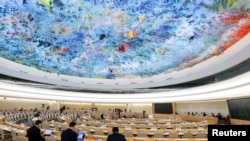Russia’s invasion of Ukraine will be hotly debated during the five-week U.N. Human Rights Council session that begins Monday.
Heads of state and other dignitaries representing more than 140 countries will address the U.N. Human Rights Council over the next three days. Quite unusually, this high-level segment will begin with a consideration of a request from Ukraine to hold an urgent debate on the “situation of human rights in Ukraine stemming from the Russian aggression.”
The council’s president, Argentinian Ambassador Federico Villegas, told journalists in Geneva that an urgent debate can take place as soon as the 47-member body decides to do so.
“And has to make a decision according to the rules of procedure, which is a consensus or a vote with a majority of positive votes over negative votes. … We had the most recent, I am sure you are very much aware in 2020, Belarus was an urgent debate, and the killing of George Floyd was also an urgent debate,” he said.
Prior to Russia’s invasion of Ukraine, Human Rights Watch Executive Director Kenneth Roth said he hoped the council would immediately address the issue if war broke out, noting the council has the capacity to help prevent war crimes.
“With respect to Ukraine, I do not see it is the council’s role to try to stop a war. That is the Security Council. But if war breaks out the council is really the leading venue to address how the war is fought and… if there are large-scale war crimes then it is the council’s role to spotlight the war crimes with the aim of deterring them,” he said.
During the session, the council will consider more than 100 reports dealing with issues such as torture, forced disappearances, extrajudicial killings, and arbitrary detention. The human rights records of some 50 countries in all regions will be examined. They include Myanmar, North Korea, Syria, Ethiopia, Democratic Republic of the Congo, South Sudan, Nicaragua, and Venezuela.
Human rights organizations are pressuring U.N. High Commissioner for Human Rights Michele Bachelet to present a long-awaited report on China’s incarceration of more than a million Uyghurs in internment camps in Xinjiang province.
The United States, France, and Lithuania have denounced Beijing’s wide-scale repression of Uyghurs as a genocide. China vigorously denies these accusations.




